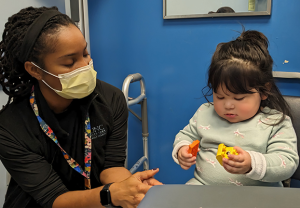
It wasn’t just the friendly, dedicated, professional staff of Piedmont Health Services, Inc. that greeted Shelby Anderson-Badbade when she first arrived at the pediatric clinic in central North Carolina. She was delighted to find one of their in-house creations: a huge smiling duck, built from bright yellow LEGO® blocks.
For Anderson-Badbade, senior program manager of Prescription for Play at the Weitzman Institute, the duck offered further evidence that a multi-year effort to introduce a culture of play inside pediatric practices was taking root.
Piedmont Health, a small system of federally qualified health centers (FQHCs), is one of Prescription for Play’s six national research sites in the Weitzman Institute’s in-depth study of the program’s effectiveness. Over the last two years, Anderson-Badbade and other members of the WI Prescription for Play (P4P) team have visited all the research sites to listen, consult, and gather a deeper understanding of program implementation and reception.
In addition to conducting research, P4P is currently operating as a national program in all 50 states and two territories with over 2,000 pediatric providers. It continues to accept new pediatric providers and practices (visit P4P online for more information about how to join).
P4P’s simple, elegant model works like this. When children ages 18-36 months come for their mandatory vaccinations, providers use the moment to talk with caregivers about play and its many benefits for children’s development. Importantly, they take a few minutes to play. They demonstrate, building LEGOs with the children and encouraging caregivers to participate. Providers offer caregivers a free play kit with LEGO DUPLO® blocks and play cards for the child to take home.
The program is designed for 18-to-36-month-olds because, Anderson-Badbade explained, while many programs exist for older children, “there are very few touchpoints for caregivers before children go to school.” Vaccinations guarantee that almost all younger children will come through the doors of a pediatric clinic. Caregivers and providers have a significant opportunity to influence child development during this window of time.
“It’s about integrating the mindset of play into the pediatric practice,” Anderson-Badbade continued, “and empowering caregivers to reframe their thinking.”
“A lot of caregivers get the idea that ‘I have to do XYZ or I’m not a great parent,’” she reflected. “But we say, there’s something you can be doing right now that will help your child, because this is how kids learn and interpret the world—through play. Providers are empowering parents to know that they can go home and play with their child right now, using any resources and safe materials they have to help their child develop.”
The Weitzman team is interested in many potential benefits of play, including speech and language development and mental health, how play protects against isolation and strengthens socialization and family relationships. The research, funded by a grant from the LEGO Foundation, also seeks to understand the many practical aspects of how pediatric practices can serve as a point of connection and education, encouraging families to play more and to understand the value of playing together.
Preliminary data indicates that P4P is easy to implement in FQHCs, high-intensity safety-net health care settings serving millions of families across the U.S. The program has had a strong and warm reception among all parties. Based on caregiver surveys, Anderson-Badbade said, “We’ve seen changes in the way caregivers understand play, their attitudes and conceptions. The mindset shift is not only applicable to caregivers, but also providers.”
Are people having fun?
“Absolutely!” Anderson-Badbade said. The resounding response from providers is that P4P builds joy into their practice in an easy, natural way.
“Culture of play doesn’t just mean you talk to caregivers,” she emphasized. “It means you demonstrate. It mitigates against toxic stress for adults, too. Play is something fun, exciting, and effective. It’s a great way for all of us to have a big impact on a child’s life.”
If you would like to know more about Prescription for Play, please visit:
